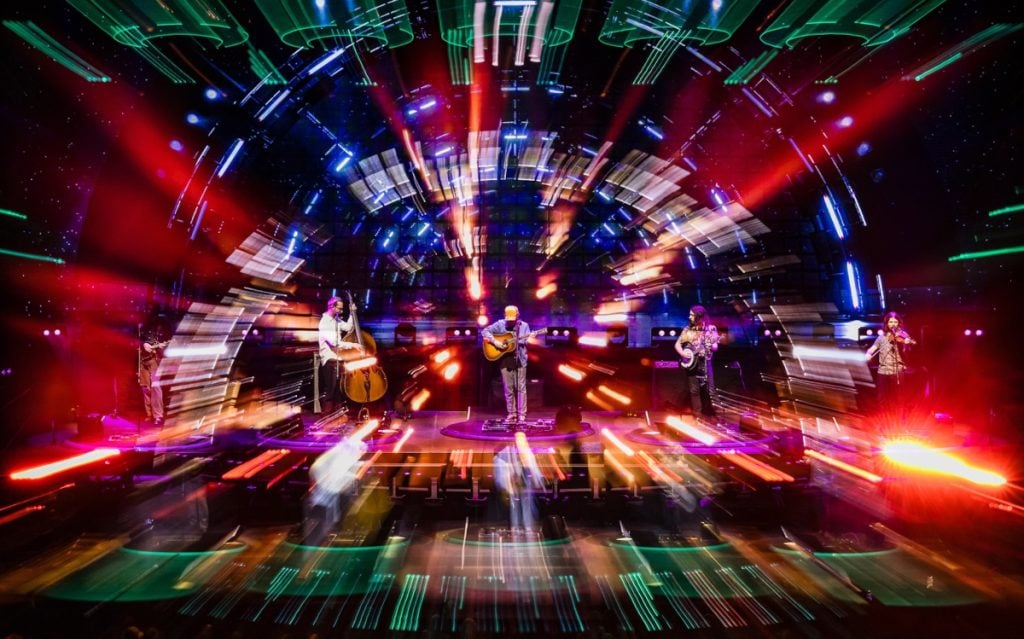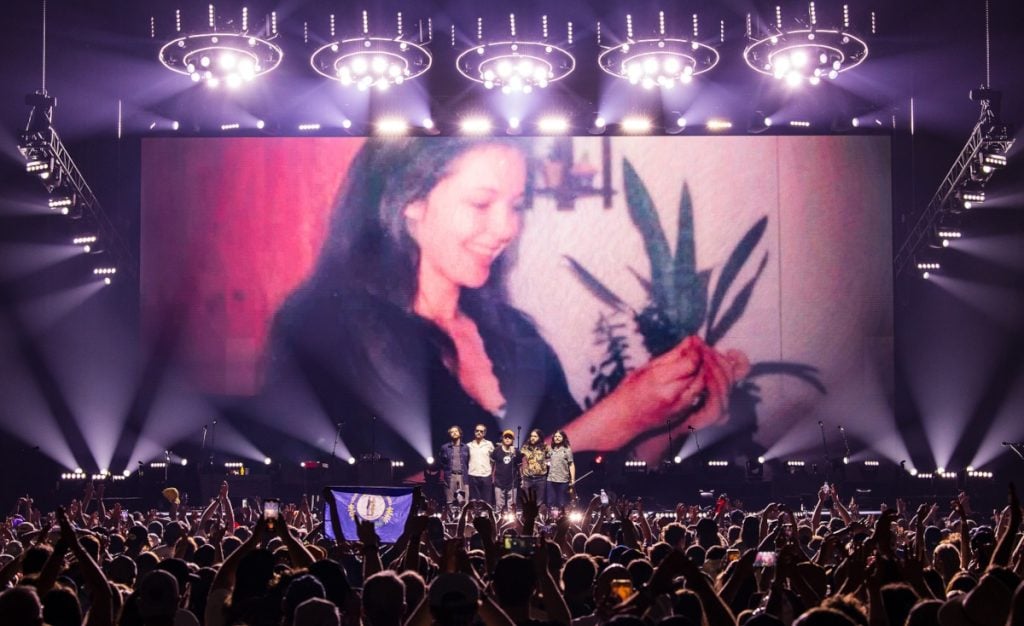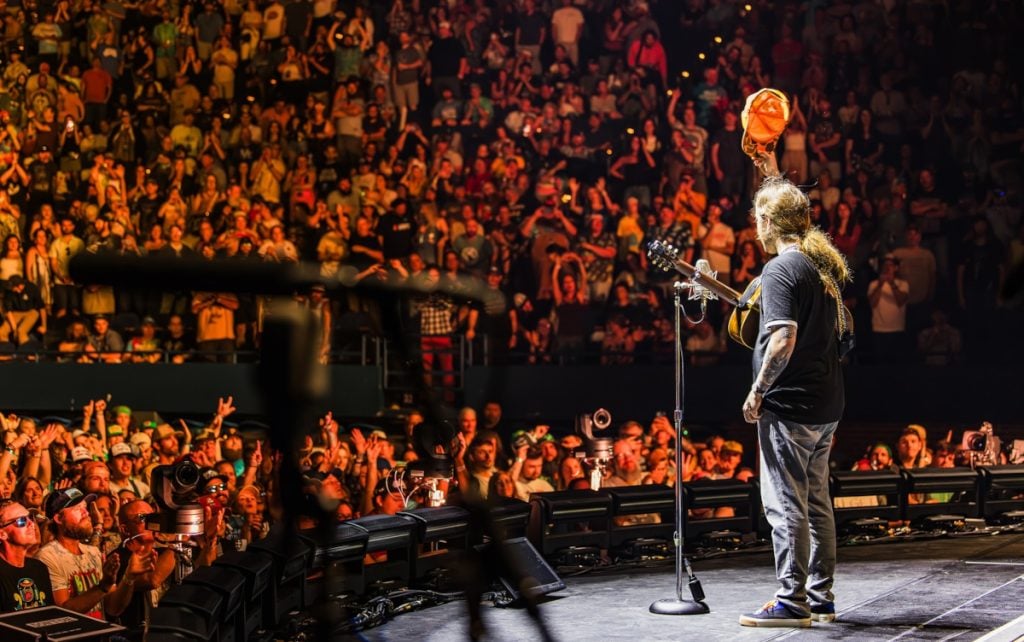The Apostols’ Family: The Billy Strings Moment in Lexington

Editor’s Note: This review is a contribution from a Billy Strings devotee named Will Coffman recalling his experience seeing Billy Strings perform at Kentucky’s Rupp arena on June 20th and 21st. The shows occurred after the passing of Billy’s mother, Debra Apostol.
– – – – – – –
By now, the story of what William Apostol, better known as Billy Strings, was going through last Friday night (6-20) as he walked onto the stage in Lexington, Kentucky’s Rupp Arena is well-known. Walking out to a darkened stage for the first of a sold-out, two-night run, he delivered the heartbreaking news, through tears, that his mother, Debra Apostol, had passed away unexpectedly.
“How tonight’s gonna turn out is kinda up in the air,” Billy said shakily. “It depends on how much strength I can muster and how much I can lean on you all … We’re a family here … If you’re going through some shit, I’m going through it too and tonight I need you.”
Billy asked the crowd not for silence, but for cheers for his mom. With tears streaming down his upturned face, he sobbed. The crowd roared.
What came next for those who filled Kentucky’s basketball mecca was devastating and magical. As Billy and his bandmates began playing, his voice cracking slightly, the crowd did as he asked: we let him lean on us. He fell deeper into the music. Huge cheers of the kind normally reserved for end-of-show favorite songs or encores met Billy at every transition, adding an instant boost to the already high-powered bluegrass he plays nightly. Wiping tears from our eyes, we danced and sang, begging him to feel the love we were sending to him.
We watched nervously. So did Billy Failing (banjo), Jarrod Walker (mandolin), Royal Masat (bass), and Alex Hargreaves (fiddle). We all watched as our hero continued to cry, play, and sing. “Thank you very much,” he said humbly after a scorching version of “Bronzeback.” These thank-yous, which came after several songs over the two night run, are not typical for Billy. And only with the benefit of time is it clear that he was thanking us for being there for him, again and again.
As Billy broke into The Beatles’ “Here Comes the Sun,” it was almost too much to bear for all of us, especially Billy. His voice was timid when he sang the first “it’s alright.” The crowd, singing louder by the second, supported his every word. By the time the song concluded, the gap between artist and audience seemed nearly imperceptible: we sang for him and he sang for us. Another Beatles cover (“Rocky Raccoon”) followed, as did many legendary Billy fan favorites. We cried and sang along as he wished to be a train, feeling no pain and having no heart. And somewhere along the way, love began to overtake tragedy.
“This is the best I’ve felt all day,” Billy said after a set break and two songs. “We love and appreciate you.” More love from the crowd. More magic from Billy. Poignant lyrics about loss and family pulled us all together into a warm singalong supported by his and the band’s incredible playing. When he introduced “Elderly Woman Behind the Counter in a Small Town” as a song his mom taught him in 4th grade, the moment could not have been more full. A ripping version of “End of the Rainbow” provided the evening’s climax, sending the crowd into a dancing-and-singing frenzy.
Billy’s song “Enough to Leave” is about loss and death. As the first notes of this ballad came from his guitar, a hush went over the crowd, except for the sobs for a woman we didn’t know, and for a man we feel like we do. For ourselves. For our parents and children and friends. For loss unspoken or unrealized. For happiness. For sadness. For Billy.
I hate to leave you, hate to say goodbye
I’m sure to hear your voice come through in the early morning sky
What can you say to me to ease my heart in pain?
Could you send a ray of light to come down and dry the rain again?
We were sent into the night by a picture of Debra herself—a beautiful, smiling young woman. Crying, laughing, stunned, exhausted, and exhilarated, we got ourselves home and told those who weren’t there what we had seen. Between nights one and two, families of all kinds heard the story of Debra and Billy. We, The Apostles, shared stories of what we had seen. We confessed to being overcome. We tried, impossibly, to separate the emotion from the music.

Night two began slowly, thanks to some “testicular difficulties” with Royal’s bass. But, by the time the first banjo solo kicked in on “On the Line,” the crowd was in end-concert form, clearly still buzzing from the night before and willing to do anything we could for Billy. We sang every chorus, danced, and loved. “It’s been a doozy,” he said just before the set break. “We appreciate it. More than you could ever know.”
A mystical electricity ran through the arena during that first set. Billy seemed happy and loose, evidenced by a extra-funky “Lumpy, Beanpole, and Dirt” and a perfect “Everything’s the Same” to end the set.
Setlist aficionados will acknowledge that the ten tunes and two encores he played after the break contain some of his best songs. Nugs.net viewers and listeners may admit having goosebumps after “Heartbeat in America” and “In the Morning Light” began the show’s closing set. But, only those present can understand how linked Billy, the band, and his audience were during their last hours together.
“It’s been very special here,” Billy said after his first cover of “Tangled Up in Blue” put the showtrain in runaway mode. He added more thank yous. The crowd screamed and sang and danced their gratitude back to him. “Slow Train” did nothing of the sort, as the gathering momentum created a giddy intensity. And when Billy and friends walked up to a single mic for the anthem “Richard Petty,” some fifteen thousand voices became one as we committed to wake up and change our ways. One of these days.
“Meet Me at the Creek,” a musical rocket ship wrapped in a bluegrass journey, is a Billy fan favorite. Those who experienced the just-over twenty minute version played last Saturday night may spend the rest of our lives arguing that that iteration rises above all others.
No better mantra for the weekend will emerge than the song’s lyric “I’m letting go of all my troubles,” words that were sung so unanimously and emphatically that they may well be permanently imprinted next to the eight Kentucky Wildcats NCAA championship banners hanging in the rafters. As the song turned to jam and the jam came back around to song, the concert reached a fever pitch where every word, note, breath, jump, and gyration became one arena-sized organism with Billy as its heart.
“Muddy water take my pain away!” we sang. The evening’s loudest roared cheer came in waves after the song’s conclusion, leaving all who were present in a mixed daze of elation and wonder.
A perfect “Shady Grove” followed, tailed by an atomic “Highway Hypnosis.” Had Billy just thanked us all by giving us a run of songs filled with more emotion than even he thought was possible? “Thank you everybody,” he said at the end of “Highway.” “Thank you for being here. …I feel closer to y’all after the last couple nights. So thank you for everything.”
It’s hard to know whether it was sweat, tears, love, or musical fairy dust covering us by the time Billy began “The Beginning of the End.” But, when he sang “I wish I could stay right here with all my friends,” we all knew—he, we, our friends new and old—we all knew those words were the truest of the weekend. We wished we could stay right here in this place forever. And, after he closed it down with a rocking cover of “Freeborn Man” followed by the peaceful, beautiful “Gild the Lily” he stayed on stage a long time, seeming also not to want to leave.
None of us wanted to leave. We knew we had seen and done something extraordinary. To leave that place was to go into the world where death and life make us weary. For a June moment in Lexington, love was greater than tragedy and family did what family does best: love, unconditionally. We let Billy lean on us. He thanked and overwhelmed us. We will none of us ever be the same.



July 1, 2025 @ 7:30 am
The magic of music….
Thanks for articulating it so well.
July 1, 2025 @ 8:33 am
“We let Billy lean on us. He thanked and overwhelmed us. We will none of us ever be the same.”
Thank you for sharing this with us.
Beautifully written.
July 1, 2025 @ 9:59 am
An awesome, moving post – well done, Trig. Grace to Billy, his family and his compadres.
July 1, 2025 @ 10:45 am
“Editor’s Note: This review is a contribution from a Billy Strings devotee named Will Coffman recalling his experience seeing Billy Strings perform at Kentucky’s Rupp arena on June 20th and 21st.”
Not on you, just wanted to make sure you see this.
July 1, 2025 @ 1:36 pm
Totally missed that. Props to Will on his post. Thanks Di.
July 1, 2025 @ 1:08 pm
Good review! This was an interesting read as well, about the minister who helped comfort Billy when he learned the news: https://pcusa.org/news-storytelling/news/2025/6/24/right-place-right-time-with-right-heart
July 1, 2025 @ 2:05 pm
A wonderful testament to his music, the man, his mom, and his supportive and loving fans.
What music can be all about…..
Wonderfully written, feeling like I was there in the crowd.
July 1, 2025 @ 3:02 pm
Will Coffman, this review and more importantly the sentiment behind it really hit home.
Thank you for sharing your thoughts,
“… For a June moment in Lexington, love was greater than tragedy and family did what family does best: love, unconditionally. We let Billy lean on us.”
Writing doesn’t get much better.
July 1, 2025 @ 8:31 pm
Billy Strings is everything music is supposed to be. I’ve been a fan for a long time. Iconic. Live is a phenomenal experience. Hope he stays strong through this loss.
July 2, 2025 @ 5:21 am
It was amazing just couch tourin from home. When I heard the notes to start Enough to Leave, I couldnt believe he played it. I was moved. To outsiders, it seems silly but it does feel like a family of sorts. My friend was there both night and look forward to his first hand account. BMFS
July 2, 2025 @ 6:56 pm
As soon as we saw Billy walk out on stage Friday night we knew something was up. He proceeded to tell the sell-out crowd a deeply emotional story of his mother passing. The show was so special, and so many tears. I feel lucky to have gone the 2 nights in Lexington.
July 3, 2025 @ 10:23 am
Awesome write up, thanks for sharing Will. Just one correction as one of those setlist nerds, this was only the first Tangled Up In Blue since 5-31-25 not ’21
July 8, 2025 @ 9:59 am
Thank you! I must’ve misread the last played notes somewhere along the way. Thank you so much for your kind comments (everyone). This was my first review ever written. I still cannot get over that show and was glad to share my perspective.
July 9, 2025 @ 7:58 pm
Amazing tribute! Thank you for sharing. I was there, sort of. Streaming nugs will never be the same, but I saw the moment live. I cried my balls off as he jammed a Mire that was one for the ages. RIP, Debra!